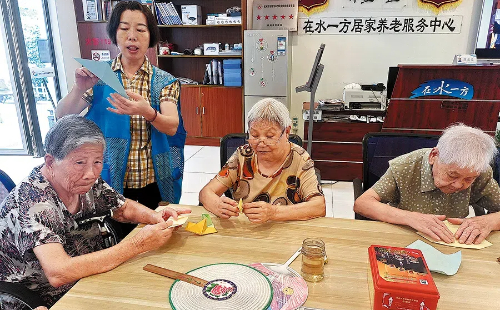Elderly care facility blends comforts of home with professional medical services

Seniors enjoy activities at an elderly center on Nanxing Street in Hangzhou, Zhejiang province. [Photo provided to CHINA DAILY]
Caring for the elderly is a pressing concern for families and governments alike. In Hangzhou, Zhejiang province, a pioneering approach is redefining how seniors are cared for, blending the comforts of home with the structure and support of professional care facilities.
At the heart of this initiative is the "Elderly Daycare Program", a concept that bridges the gap between institutional and home-based care. It provides seniors with a place to socialize, learn, exercise and dine together, while receiving the professional care and attention they need. It's a refreshing alternative for those who prefer to stay within their communities rather than move into a nursing home.
"While most streets in Hangzhou have home-care centers, our center focuses specifically on daycare for the elderly. It's similar to a daycare center for children," said Wu Jiarong, head of the Public Service Office in Nanxing Street, which opened a center in 2020.
This model caters to elderly individuals who, due to financial reasons or strong ties to their neighborhood, are reluctant to move into a nursing home.
Nestled within a traditional Chinese courtyard spanning 3,000 square meters, the center is conveniently located near a community dining hall and health service station. It provides a range of services, including dining, bathing assistance, laundry, rehabilitation care, psychological counseling and more.
With 15 beds and various facilities, it has become a lifeline for the community's seniors who have lost both physical and cognitive abilities. The center has served over 14,000 people annually.
Huang Xinghong, the center's director, explained the daily routine.
"Seniors usually arrive between 8 and 9 am. We begin with a morning check, where they clock in with facial recognition and have their temperature taken. Each senior has a designated seat, and our staff perform routine checks such as measuring blood pressure and oxygen levels. If anything unusual is detected, we immediately notify the nearby health center and the senior's family," she said.
After the morning check, the staff lead the seniors in simple exercises, followed by activities like watching movies or casually chatting. At noon, some seniors return home for lunch, while others dine at the center. The afternoon is reserved for activities such as handicrafts, paper-cutting and cognitive training exercises, providing mental stimulation and enjoyment.
"The seniors in our daycare program have an average age of 86, with the oldest being 97," Huang said.
Family feedback has been overwhelmingly positive, with many expressing relief that their loved ones are in good spirits.
"Some seniors don't live with their children, but they share their experiences at the center with them, which reassures their families," Huang said.
In addition to in-person services, the center also offers 24-hour online monitoring.
Most seniors have installed a three-piece security set at home, including a door sensor, an SOS emergency call button, and a device that monitors their movements.
This innovative approach to "elderly care at your doorstep" is becoming increasingly popular in Hangzhou, which has established over 2,900 home-care service centers at town and village levels.
Huang notes that people from other provinces, such as Jiangsu and Shanxi, have visited to learn from their experience. The latest Special Plan for the Layout of Elderly Care Service Facilities in Hangzhou sets goals and guidelines for 2025 and beyond, planning to achieve comprehensive coverage of home-care services in all urban and rural communities of the city.





 play
play